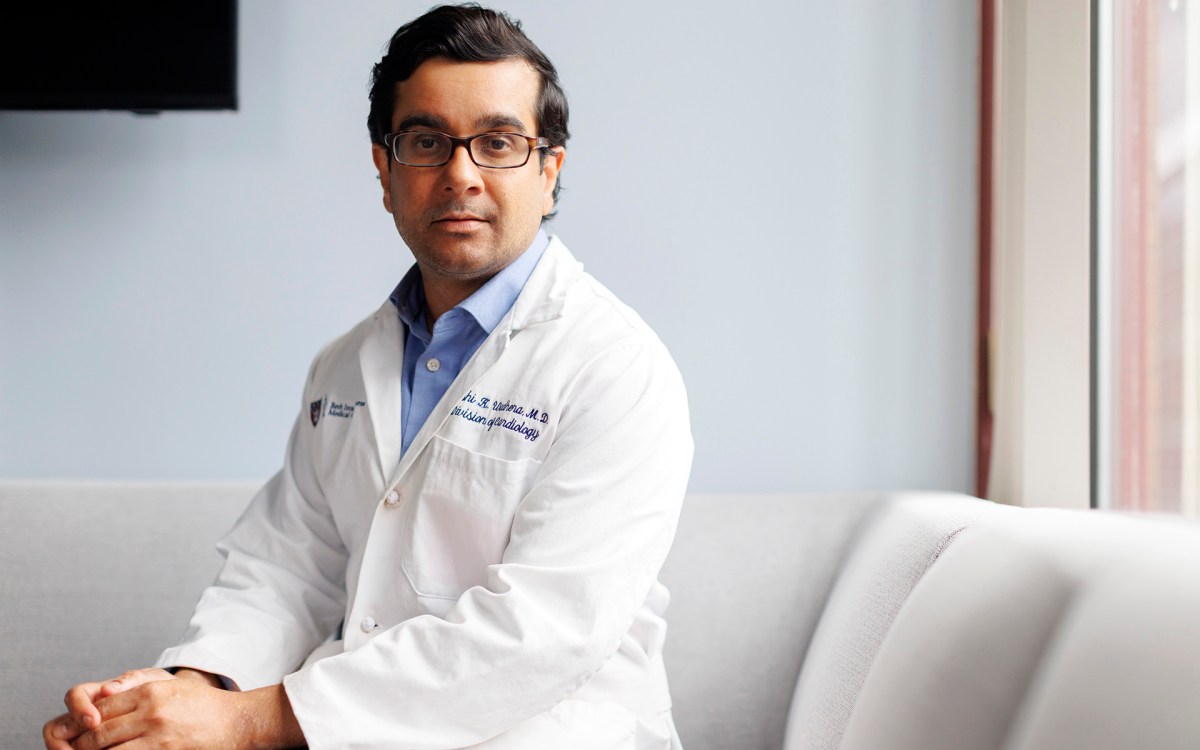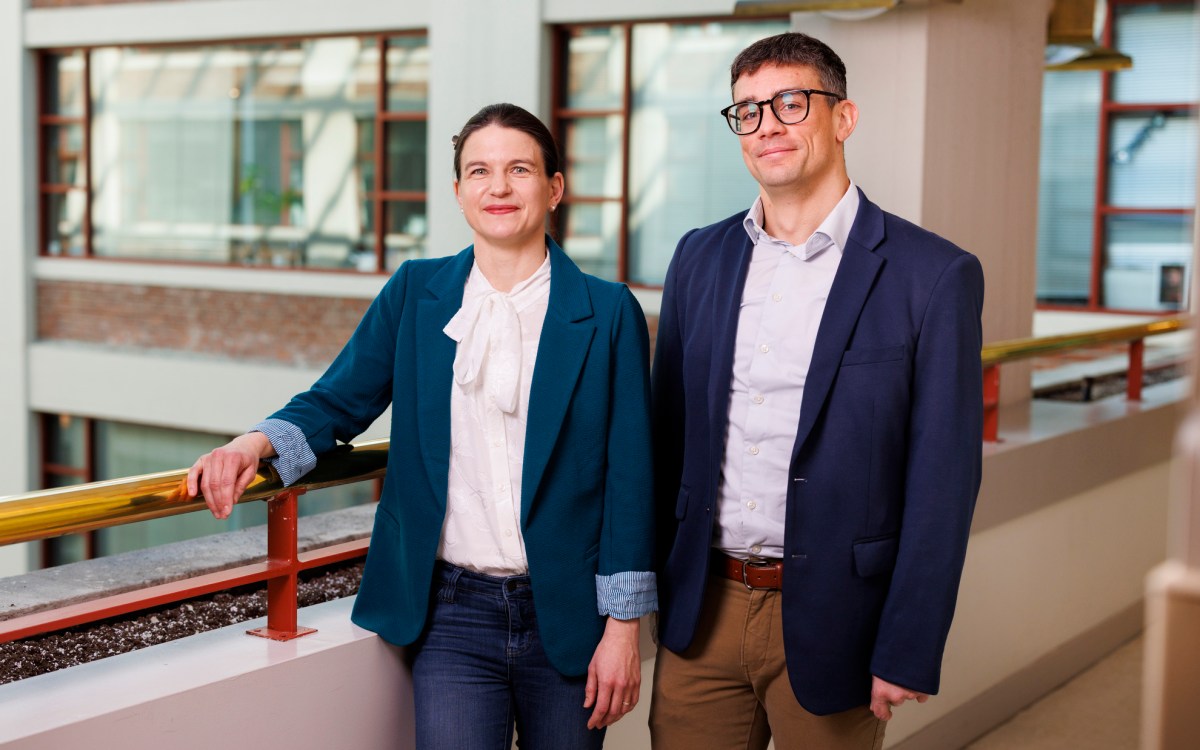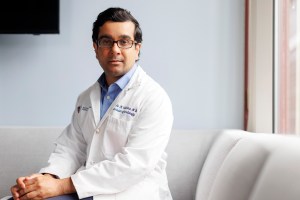Health
-

American heart health worsening
New statistical snapshot finds disappointing trend despite advances in treatment, ways to prevent nation’s leading cause of death

-

Tracking mysteries of loss of Y chromosome, cancer
Research suggests it may explain higher incidence, severity of some disease in men
-

How realistic is ‘The Pitt’?
Doctors weigh in on what hit TV show gets right and wrong about life in the ER — from pacing and caseloads to workplace culture (and that waiting room from hell)
-

Yoga can help cut severe, initial opioid-withdrawal period in half, study finds
Researchers say results could dramatically increase chances of recovery
-

6 keys to a long, healthy life (ice cream included)
Also, why reading Ben Franklin beats climbing Mount Everest
-

Six cancers rising faster in younger adults than older ones
Large new global study fuels growing concern over trend of increases in several types

-
Many Americans at high risk from flu not vaccinated
The Centers for Disease Control and Prevention highly recommends the flu vaccine for certain high-risk groups including people with chronic illnesses, children between the ages of six and 23 months,…
-
Sperm cells made in lab can fertilize eggs
Scientists injected laboratory-created sperm into eggs, and the resulting embryos grew to the point where they would normally be implanted into a womb. The experiment was done with mouse stem…
-
One combination of AIDS drugs appears better for starting treatment
Combination drug therapy – also called highly active antiretroviral therapy (HAART) – made a huge difference in the treatment of HIV infection during the 1990s, changing HIV/AIDS into an illness…
-
Scientists create lab model of human pancreatic cancer
Currently, nearly all the 30,000 cases of pancreatic cancer diagnosed annually are fatal within a matter of months because they are too advanced to remove surgically by the time they…
-
Researchers shed light on myotonic muscular dystrophy
Research by scientists at Beth Israel Deaconess Medical Center (BIDMC) helps to explain the wide range of signs and symptoms associated with myotonic muscular dystrophy (MMD). The findings appeared in…
-
Ritalin use in childhood may increase depression
A study, led by McLean Hospital’s William Carlezon and Susan Andersen, found that adult rats given Ritalin as juveniles behaved differently than their placebo-treated counterparts in a host of tests…
-
Finding challenges predominant theory that arthritis prevents bone loss
For more than 30 years, it has been accepted in the medical community that women with arthritis are actually much less likely to experience accelerated bone loss. New findings, outlined…
-
Dramatic gains shown with moderate weight loss, exercise
A study of 35 obese people included three groups of volunteers; all were obese and had a body mass index above 30 kg/m2 and had insulin resistance. The first group…
-
Researchers find way to block SARS virus from entering cells and spreading infection
SARS – severe acute respiratory syndrome – is a viral respiratory illness caused by coronavirus, a family of viruses also implicated in the common cold. SARS is a distinct form…
-
Strategies to help AIDS patients take medicines are cost effective
The effectiveness of antiretroviral therapy for HIV infection depends on how well patients adhere to complicated drug regimens. Researchers found that among patients with lower levels of adherence to their…
-
Smoking increases bleeding into the brain, study finds
A research team at Brigham and Women’s Hospital (BWH) found that stroke risk for women increased proportionately with the number of cigarettes smoked each day. In contrast, women who stopped…
-
Regeneration of insulin-producing islets may lead to diabetes cure
Type 1 diabetes develops when the body’s immune cells mistakenly attack the insulin-producing islet cells of the pancreas. As islet cells die, insulin production ceases, and blood sugar levels rise,…
-
Physicians report trouble obtaining specialty services for uninsured
A research team surveyed more than 2,000 physicians at U.S. academic health centers who had provided direct patient care during the preceding year. Among the questions asked were whether the…
-
Study challenges proposed changes to clinical definition of mental illness
As the American Psychiatric Association prepares for the Diagnostic and Statistical Manual of Mental Disorders’s fifth edition, there is debate over whether to eliminate milder forms of diseases to prevent…
-
Adolescent stress can change brain during adulthood
Researchers found that adult rats exposed to a social stress during adolescence (ages approximating 13 to 15 years in humans) showed a significant decrease in a specific protein found in…
-
Is your heart in the right place?
In a frog, the position of the heart is determined within the first hour in the womb, Harvard scientists have discovered. Researchers all over the world believe that frogs and…
-
Did life originally spring from clay?
While the research is a far cry from proving that humans sprang from clay, as some creation myths assert, it does provide a possible mechanism for explaining how life initially…
-
Enzyme responsible for protein’s ‘Jekyll-and-Hyde’ personality
Normally, a protein regulates when and how body parts develop, but when mutated, it triggers a rare, often-lethal infant leukemia called mixed lineage leukemia. The newly identified protease enzyme, Taspase1,…
-
Researchers boost blood cancer fight
Working with colleagues at the University of Rochester School of Medicine, Harvard researchers found that giving mice a hormone known for building bones increased their production of blood stem cells.…
-
Study shows medical schools lack end-of-life training
A study, published by Dana-Farber researchers in the September 2003 issue of the Journal of General Internal Medicine, suggests that increasing medical students’ opportunities to learn about end-of-life care will…
-
Matrix-buster inhibitor has second way to throttle angiogenesis
Matrix metalloproteinases (MMPs) and their regulators, the tissue inhibitors of metalloproteinases (TIMPs), form an intriguing partnership. MMPs work by breaking down the dense matrix surrounding cells, freeing them to wander…
-
The links between creativity, intelligence, and mental illness
“Scientists have wondered for a long time why madness and creativity seem linked, particularly in artists, musicians, and writers,” notes Shelley Carson, a Harvard psychologist. “Our research results indicate that…
-
Compound traces brain plaques in real time
Alzheimer’s disease is notoriously difficult to diagnose. Though sophisticated functional and cognitive tests can help, they often fail to distinguish between Alzheimer’s and other non-amyloid-based dementias, particularly frontotemporal dementia. The…
-
Innate signal sparks homing of T cells
The results of three studies published together in the Aug. 31, 2003 online edition of Nature Immunology help explain the uncanny ability of T cells to home to problem areas…
-
Stages of memory described in study
“To initiate a memory is almost like creating a word processing file on a computer,” explains researcher Matthew Walker, instructor of psychiatry at Beth Israel Deaconess Medical Center and Harvard…
-
Dieting may actually promote weight gain in children
The prevalence of overweight and obese children has increased by 100 percent since the 1980s. Americans spend about $33 billion a year on weight loss products and services, however, only…
-
Hold that penicillin
“The threat of resistance to antibiotics by bacteria increased so dramatically from the 1970s to the mid-1990s that the Centers for Disease Control and Prevention (CDC) labeled it a national…
-
Improved procurement could more than double organ availability
Although millions of people across the country are registered organ donors, only 2 percent of them annually suffer brain death and meet the other medical requirements for being a cadaveric…
-
Close interaction seen between blood vessel development and fat tissue formation
Findings from researchers at Massachusetts General Hospital could eventually help to solve problems ranging from cancer, to obesity, to the development of replacement organs. The findings involve the key physiological…
-
Stricter alcohol policy enforcement may curb college drinking
A study consisted of 11 public schools, including three state university campuses and eight state colleges that fall under the purview of the Massachusetts Board of Higher Education (MBHE). In…


